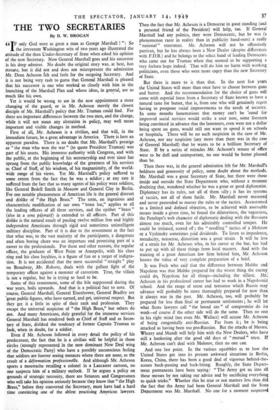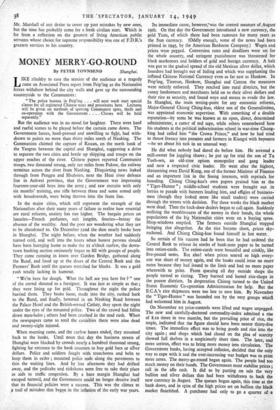THE TWO SECRETARIES
By D. W. BROGAN
-11-F only God were as great a man as George Marshall ! ": So JL the irreverent Washington wits of two years ago illustrated the attitude of the then Under-Secretary of State when asked his opinion of the new Secretary. Now General Marshall goes and his successor is his deep admirer. No doubt the original story was, at best, ben trovato, but it did not and does not misrepresent the admiration Mr. Dean Acheson telt and feels for the outgoing Secretary. And it is not being very rash to guess that General Marshall is pleased that his successor is one who worked so closely with him in the launching of the Marshall Plan and whose ideas, in general, are so much like his own.
Yet it would be wrong to see in the new appointment a mere changing of the guard, or in Mr. Acheson merely the closest disciple of Mr. Marshall's policy that Mr. Truman could find. For there are important differences between the two men, and the change, while it will not mean any alteration in policy, may well mean important and visible changes in method.
First of all, Mr. Acheson is a civilian, and that will, in the immediate future, be a great advantage in America. There is here an apparent paradox. There is no doubt that Mr. Marshall's prestige as " the man who won the war " (to quote President Truman) was part of his assets. His immense authority with Congress, and with the public, at the beginning of his secretaryship and ever since has sprung from the public knowledge of the greatness of his services as Chief of Staff, of his wisdom, of his magnanimity, of the world- wide range of his views. Yet Mr. Marshall's policy suffered to some extent from the fact that he was a soldier ; at any rate it suffered from the fact that so many agents of his policy were soldiers, like General Bedell Smith in Moscow and General Clay in Berlin. For one notable phenomenon of American life is the general distrust and dislike of " the High Brass." The term, an ingenious and characteristic modification of our own " brass hat," applies to all the leading officers of all three services, and the epithet " brass " (also in a sens pijoratif) is extended to all officers. Part of this dislike is the natural result of passing twelve million free and highly independent Americans through rigid and sometimes unintelligent military discipline. Part of it is due to the resentment at the fact that what was, to the vast majority of the participants, a dangerous and often boring chore was an important and promising part of a career to the professionals. For these and other reasons, the regular officer, the graduate of West Point or Annapolis, with his class ring and his class loyalties, is a figure of fun or a target of indigna- tion. It is not accidental that the most successful " straight " play on Broadway, Mr. Roberts, deals with the gallant fight of the temporary officer against a monster of careerism. True, the villain is not a regular, but he is trying so hard to be.
Some of this resentment, some of the bile suppressed during the war years, boils upwards. And that is a political fact to note. Of course, General Marshall, General Eisenhower, General Bradley are great public figures, who have earned, and get, universal respect. But they get it a little in spite of their rank and profession. They escape the universal suspicion of " the High Brass," but others do riot. And many Americans, duly grateful for the immense services General Marshall has rendered both as Chief of Staff and as Secre- tary of State, disliked the tendency of former Captain Truman to look, when in doubt, for a soldier.
Even if Mr. Acheson followed in every detail the policy of his predecessor, the fact that he is a civilian will be helpful in those circles (strongly represented in the now dominant New Deal wing of the Democratic Party) who have a possibly unconscious feeling that soldiers are forever seeing menaces where there are none, as the result of a deformation professionelle. And although Mr. Acheson sports a moustache recalling a colonel in a Lancaster cartoon, no one suspects him of a military outlook. If he argues a policy on grounds of strategic necessity, there are Senators and Congressmen who will take his opinion seriously because they know that " the High Brass," before they converted the Secretary, must have had a hard time convincing one of the ablest practising American lawyers. Then the fact that Mr. Acheson is a Democrat in good standing (and a personal friend of the President) will help, too. If General Marshall had any politics, they were Democratic, but he was (a phenomenon rarer in reality than in publicity hand-outs) a really " national " statesman. Mr. Acheson will not be offensively partisan, but he has always been a New Dealer (despite differences with F.D.R.) and he belongs to the select band of leading Democrats who came out for Truman when that seemed to be supporting a very forlorn hope indeed. That will do him no harm with working politicians, even those who were more cagey than the new Secretary of State.
But there is more to it than that. In the next few years the United States will more than once have to choose between guns and butter. And the recommendation for the choice of guns will come with especial force from a Secretary of State known to have a natural taste for butter, that is, from one who will genuinely regret having to postpone social improvements to the needs of security. In some mouths lamentations that money can't be 'ound for improved social services would strike a sour note, some listeners being convinced in advance that the lamenters, even were not a dollar being spent on guns, would still not want to spend it on schools or hospitals. There will be no such suspicion in the case of Mr. Acheson, nor any suspicion (any more than there was in the case of General Marshall) that he wants to be a brilliant Secretary of State. If by a series of miracles Mr. Acheson's tenure of office were to be dull and unimportant, no one would be better pleased than he.
Then there was, in the general admiration felt for Mr. Marshall's boldness and generosity of policy, some doubt about the methods. Mr. Marshall was a great Secretary of State, but there were those inside and outside the State Department who, without a moment doubting that, wondered whether he was a great or good diplomatist. Diplomacy has its rules, not all of them silly ; it has its systems of tactics, not all of them futile. Mr. Marshall never mastered and never pretended to master the rules or the tactics. Accustomed to a limited and defined objective, to be achieved with assessable means inside a given time, he found the dilatoriness, the vagueness, the Penelope's web character of diplomatic dealing with the Russians almost too much, even for his admirably controlled temper. He could be irritated, scored off ; the " needling " tactics of a Molotov or a Vyshinsky sometimes paid dividends. To listen to impudence, mendacity, nonsense, distortion was a great strain. It will be less of a strain for Mr. Acheson who, in his career at the bar, has had to put up with all these things from local masters. And with the training of a great American law firm behind him, Mr. Acheson knows the value of very complete preparation of a brief.
It was Foch who said that the difference between Moltke and Napoleon was that Moltke prepared for the wisest thing the enemy could do, Napoleon for all things—including the silliest. Mr.' Acheson in his professional career has had to work in a Napoleonie school. And the range of sense and nonsense which Russia may advance will probably be more thoroughly prepared for now than it always was in the past. Mr. Acheson, too, will probably be prepared for less than final or permanent settlements ; he will let what Scots lawyers call " the broad axe " of compromise do its work—of course if the other side will do the same. Then no one in his right mind (not even Mr. Wallace) will accuse Mr. Acheson of being congenitally anti-Russian. Far from it ; he is being attacked as having been too pro-Russian. But the attacks of Messrs. Wherry and Mundt will help him with the New Dealers, who have still a hankering after the good old days of " mutual " trust. If Mr. Acheson can't deal with Molotov, then no one can.
And one last point. In the various squabbles as to how the United States got into its present awkward situations in Berlin, Korea, China, there has been a good deal of vigorous behind-the- scenes buck-passing and back-biting. Roughly, the State Depart- ment permanents have been saying: "The Army got us into all these messes by not taking our advice and by sacrificing everything to quick tricks." Whether this be true or not matters less than did the fact that the Army had been General Marshall and the State Department was Mr. Marshall. No one for a moment suspected Mr. Marshall of any desire to cover up past mistakes by new ones, but the time has probably come for a fresh civilian start. Which is far from a reflection on the greatest of living American public servants whose choice for supreme responsibility Was one of F.D.R.'s greatest services to his country.



































 Previous page
Previous page